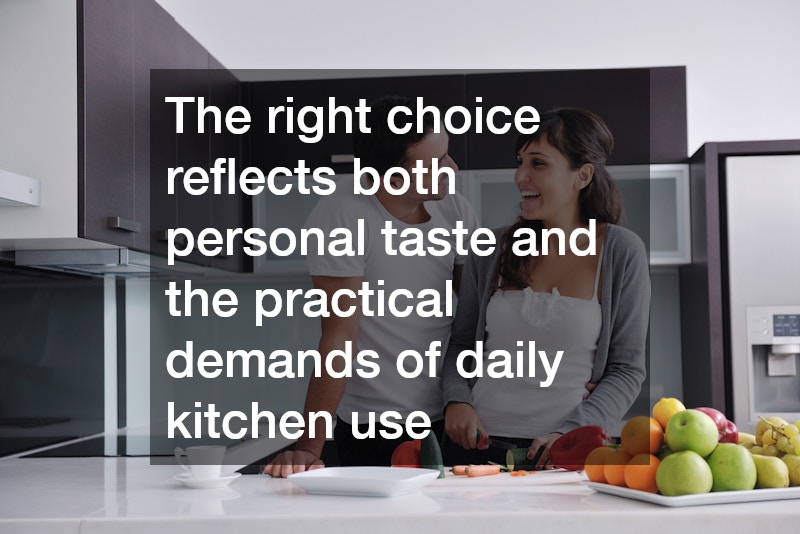
Choosing the right material for your kitchen countertop is crucial as it affects both the functionality and aesthetics of your kitchen space. Your kitchen countertop company will provide you with many options. This article explores the best materials available for kitchen countertops, focusing on durability, maintenance, and cost-effectiveness. We’ll provide in-depth insights into each material’s characteristics, helping you make an informed decision that suits your lifestyle and design preferences.
How Does Durability Vary Among Popular Kitchen Countertop Materials?
Granite
Granite is renowned for its natural beauty and excellent durability, making it a popular choice for kitchen countertops. It is heat-resistant and less prone to scratches, although it does require sealing to prevent stains. Therefore, granite suits busy kitchens where high heat from cookware and potential surface scratches from cutting utensils are common concerns.
When considering granite, homeowners should note its heavy weight and the robust support structure it needs. Nevertheless, once installed, granite can last for decades with proper maintenance. The unique patterns and colors of natural granite also add a touch of elegance and individuality to kitchens.
Quartz
Quartz countertops are engineered stone products that combine natural quartz with resins. They are highly durable, resistant to stains and scratches, and do not require sealing, making them a low-maintenance option. Quartz’s uniform look, unlike the randomness of natural stone, offers a consistent and sleek aesthetic ideal for modern kitchens.
This material’s factory-made nature allows for a wider range of color options than natural stone can offer. Additionally, the resins act as a binding agent, enhancing the hardness and non-porous characteristics of the surface. This ensures that quartz can handle the daily rigors of meal preparation with ease.
Withstanding the challenges of busy kitchens, quartz’s non-porous feature makes it highly resistant to bacterial growth and staining from liquid spills. Its surface requires simple, routine cleaning, consolidating its place as a practical countertop choice. Investment in quartz offers a long-term payoff in durability and effortless upkeep.
Marble
Marble offers a classic and luxurious look. However, it is softer and more prone to scratches and stains compared to granite and quartz. Regular sealing and careful maintenance can enhance its durability.
Recognized for its timeless beauty, marble provides a unique blend of elegance in kitchen spaces. It boasts a rich history in art and architecture, which translates into adding a sophisticated touch to any home setting. However, due to its susceptibility to etching from acidic substances, owners need to be vigilant with spills.
The cooling properties of marble make it particularly appealing to avid bakers, aiding in keeping pastry dough at the correct temperature. While it requires more maintenance, the sense of luxury and warmth it adds is unrivaled. When properly maintained, marble can significantly uplift a kitchen’s ambiance and earthy allure.
What Are the Maintenance Requirements for Kitchen Countertop Materials?
Granite Maintenance
Regular cleaning with mild soap and water is essential. Additionally, granite countertops require periodic sealing to maintain their stain resistance and prolong their lifespan. Performing these maintenance tasks ensures the longevity of the granite and protects your investment in kitchen aesthetics.
The sealing process creates a protective layer over the granite, preventing the absorption of liquids and thereby reducing the risk of staining. Homeowners typically reseal granite annually, although this may vary depending on usage and the quality of the sealant. By adhering to a consistent maintenance routine, granite surfaces retain their luster even under consistent use.
Granite’s naturally porous nature means that neglecting sealing could cause vulnerability to stains and bacterial ingress. By committing to care routines, you preserve the natural stone’s beauty and functional reliability. Ensuring appropriate support and adherence to maintenance schedules reflects granite’s esteemed status in countertop selections.
Quartz Maintenance
Quartz countertops are non-porous, which makes them easy to clean and resistant to stains. Regular wiping with a damp cloth and mild detergent suffices for upkeep, with no need for sealing. This convenience makes quartz an attractive option for busy households where ease of maintenance is crucial.
Non-porous materials like quartz prevent spills from penetrating the surface, significantly reducing the risk of permanent stains. Consequently, quartz remains a favorite among those wishing to combine style with practicality. Its resistance to etching further attests to the minimal effort required to maintain its appearance.
Marble Maintenance
Marble needs more attentive care, including immediate cleanup of spills and the use of coasters to prevent etching. Frequent sealing is also recommended to preserve its natural beauty. Despite these requirements, many find the aesthetic payoff worth the extra effort.
Marble’s porous nature calls for cautious use and quick response to spillage, preventing lasting damage to the surface. The use of appropriate cleaning agents specifically designed for marble can aid in maintaining its smooth finish. Emphasizing preventive measures helps maintain marble’s unique veining and brilliance.
Despite its softness compared to quartz and granite, marble can endure with dedicated care regimes. Its cooling properties cater well to specific culinary activities, highlighting its functional benefits alongside aesthetics. Investing time in its maintenance confirms marble’s premium standing in kitchen designs.
Selecting the perfect kitchen countertop material involves balancing factors like durability, maintenance, and aesthetics. By understanding the attributes of granite, quartz, and marble, homeowners can make informed decisions that suit their lifestyle and kitchen design. Ultimately, the right choice reflects both personal taste and the practical demands of daily kitchen use.
.





